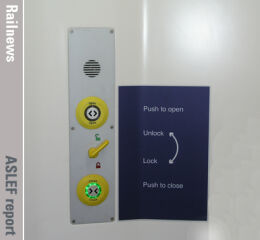Posted 18th November 2024 | 1 Comment
ASLEF calls for action over toilet crisis

The drivers’ union ASLEF is calling for radical improvements to the provision of toilets for drivers, because the lack of hygienic facilities is a ‘real problem’.
ASLEF will be launching a report called Dignity for Drivers at the House of Commons tomorrow, to coincide with World Toilet Day.
The union reports that many drivers have to use unsuitable containers or even a bush, while some deliberately dehydrate themselves, which can affect concentration on their safety-critical job.
It is calling for clean, hygienic toilets offering privacy, as well as warm running water, a sink, soap, and safe sanitary disposal. One in eight drivers suffer from a disability and have found their health has been worsened by their inability to use a toilet during the working day.
ASLEF general secretary Mick Whelan said: ‘It cannot be right that train drivers are often left with no dignified or hygienic options for carrying out basic bodily functions. And this problem only serve to undermine efforts by stakeholders in the rail industry to recruit a more representative number of women to the driver’s seat.
‘Some train drivers choose not to drink tea or coffee or water – “deliberate dehydration” – to avoid having to go to the toilet. Not maintaining good fluid levels has an effect on concentration, and harmful long-term effects on health, too. Driver’s cabs can reach temperatures of 30°C in the summer heat.
‘Some drivers are having to change sanitary towels in bushes by the side of the track – that’s outrageous in a first world country in the 21st century. Who wants to urinate in a bush? One woman driver used her hard hat. It’s time our industry realised its obligations and did the right thing – not just for drivers but for the passengers and goods they move around this country.
‘We need to address this issue and address it now. Long-term, the answer is to design out the problem. When the train operating companies and freight operating companies are commissioning a new train they should build and design it with a staff toilet on board.
‘And, in the meantime, companies, when retrofitting old stock, need to come up with a solution to the problem. Some firms are fitting camping toilets on old trains and, while not great, freight drivers say a camping toilet is better than a bush.
‘This report makes grim reading. But read it you should. Because only then, when the extent of the problem is understood, can we begin to put things right.’
Reader Comments:
Views expressed in submitted comments are that of the author, and not necessarily shared by Railnews.

Neil Palmer, Waterloo
Just reading the headline I thought Mick was just taking the p*ss again, but he does have a point here.
However, apart from single loco moves and freight trains (where there could be room to at least fit a camping toilet in the loco) why can't drivers of passenger trains just use the onboard toilets (or those at a station) when the train is stopped? Is there some HSE/safety or union rule against that? Or is this problem just related to depot clocking on/off locations?